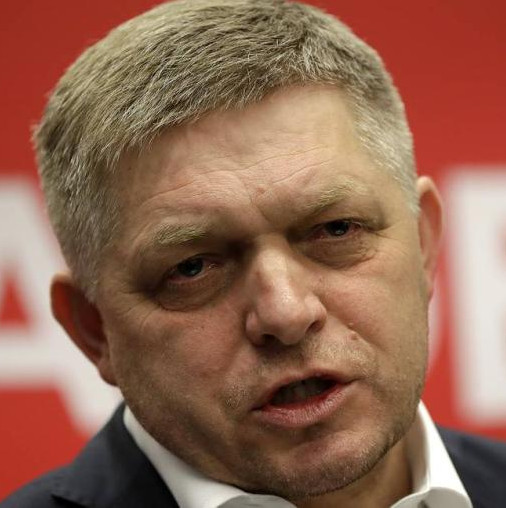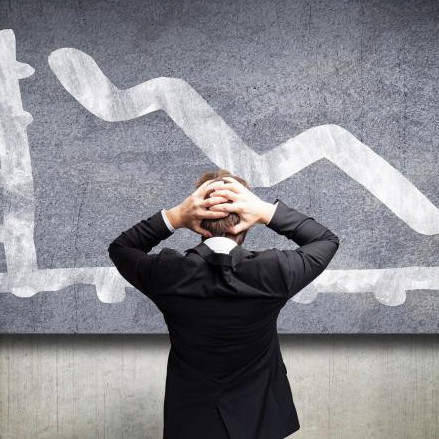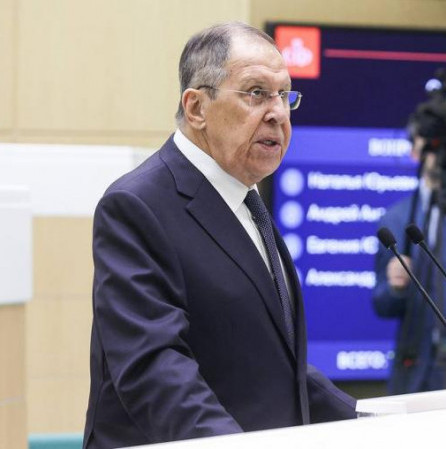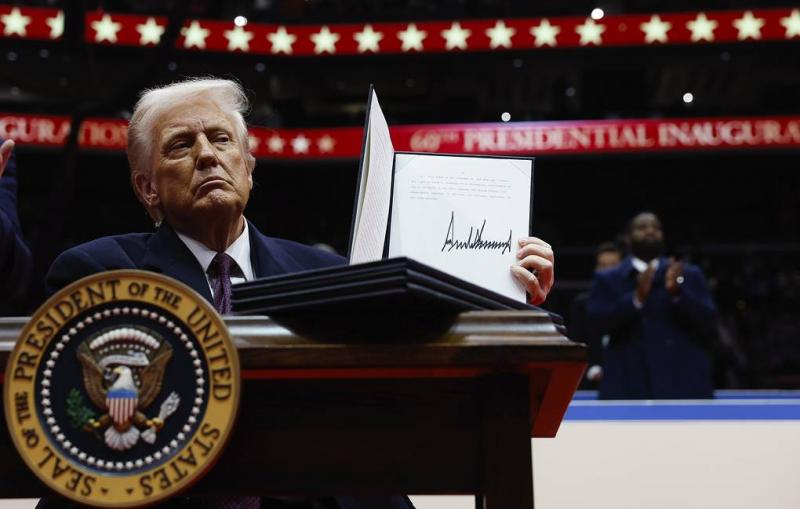Washington’s policies drive divisions between Western countries; a potential Palestinian exodus from Gaza will make Israel more vulnerable; and Donald Trump commences major changes in the Pentagon. These stories have topped Tuesday’s newspaper headlines across Russia, according to TASS News Agency.
Media: Washington’s policies fuel divisions between Western countries
US President Donald Trump’s plans to impose a 25% tariff on all steel and aluminum imports have sparked a sharp reaction even from Washington’s allies. South Korea, France, and Germany are already working on retaliatory measures; Australia is also unhappy with the situation. Economic tensions may amplify disagreements among partners, particularly between Washington and Brussels, whose relations worsened during Trump's first term in office, Izvestia writes.
"Trump is acting mechanically, seeking to reduce the imbalance in trade with the European Union, which, in his words, stands at about 300 billion euros. He seeks to cut the deficit in the areas where European exports reach the highest levels financially. Trump does not so much want the Europeans to stop exporting metals to the US market as he wants them to increase exports from the US. He keeps repeating the mantra that they should purchase more US liquefied natural gas, oil products, weapons, and military hardware. So far, this looks like part of the bargaining and preparations for a new agreement," Stanislav Tkachenko, St. Petersburg State University professor and Valdai International Discussion Club expert, pointed out.
"As soon as it gets down to actual steps and retaliatory measures, everyone will lose in the long term. Trade tensions may weaken the entire collective West. The European Union will suffer a blow first as its positions have been deteriorating due to a series of events, including the coronavirus pandemic, the Ukraine crisis, and related energy issues," Tkachenko said. However, an all-out trade war should not be expected to break out between the US and the EU just yet because the European Union is too divided to give a collective response, the expert emphasized. Still, the radical economic policy that Trump has adopted will only worsen the crisis that Europe is facing, while the US is likely to see a further rise in inflation.
Unlike Trump’s recent threats to introduce tariffs on Canadian and Mexican imports, his aluminum and steel tariffs have solely economic importance, Vladimir Vasilyev, senior research fellow at the Russian Academy of Sciences’ Institute for US and Canadian Studies, told Vedomosti. According to him, Trump aims to use them to revive American production. However, tariffs will either send US domestic prices up or lead to a decline in aluminum consumption, Finam analyst Alexey Kalachev said. "Expanding domestic production requires investment and, most importantly, time. It will certainly take longer than Trump’s presidential term will last," he noted.
Nezavisimaya Gazeta: Potential Palestinian exodus from Gaza to make Israel more vulnerable
US President Donald Trump’s much-talked-about plan to relocate Gazans needs more elaboration, the Kremlin said, commenting on the US leader’s remarks that he intended to purchase the Palestinian enclave and persuade Middle Eastern countries to invest in its development. Egypt and Jordan, who are supposed to accept Palestinian immigrants under the plan, have already warned Israel via intelligence agencies that the deportation of the Arab population would result in Hamas establishing positions along the border of the Jewish state, Nezavisimaya Gazeta writes.
The Hamas group has already started to work to restore its combat capacity last year, when militants tried to infiltrate civilians, the Israeli newspaper Haaretz notes, citing related agencies.
According to Andrey Yashlavsky, leading researcher at the Russian Academy of Sciences’ Institute of World Economy and International Relations and expert in religious terrorism and extremism, the main question about Trump’s initiative is where to resettle civilians. "Neither Egypt nor Jordan are eager to accept large numbers of destitute people," the expert noted. "These people can potentially pose a national security threat, especially since the Gaza population has always been inclined to support Hamas, an Islamist movement linked to the Muslim Brotherhood group (designated as a terrorist organization and outlawed in Russia - Nezavisimaya Gazeta). The organization has complicated relations with the authorities in Egypt and Jordan," he explained. The analyst pointed out that Jordan still remembered the tragic events of September 1970, when Palestinians, who at the time made up a large part of the country’s population, tried to oust King Hussein.
"Such initiatives play into the hands of the Hamas movement, which, in my view, could not only restore its capacity with time but also expand its presence," the expert maintained. "That said, the Islamist group’s approach may change. Today, it can be described as a group acting at the local level," he said. However, Yashlavsky does not rule out that if Trump’s plan is implemented, "chances are high that, apart from Israel, the US could also turn into an enemy for Hamas, being a country that is depriving the Palestinian people of their homeland." In this case, Western countries will become another target for Hamas’ terrorist activities, the expert concluded.
Nezavisimaya Gazeta: Trump initiates major changes in the Pentagon
Donald Trump has announced an audit of the Pentagon’s use of public funds, which will be conducted by the Department of Government Efficiency (DOGE) led by Elon Musk. The Pentagon chief Pete Hegseth has voiced support for the initiative. Trump’s main goal is to make the US Armed Forces more effective and loyal to the president, where possible, Nezavisimaya Gazeta notes.
Vladimir Vasilyev, senior research fellow at the Russian Academy of Sciences’ Institute for US and Canadian Studies, points out that the problem of overspending and the procurement of overpriced weapons did not emerge yesterday but is systemic. "The Pentagon is responsible for half of the budget overruns," the expert noted.
Moreover, in the analyst’s words, the US president seeks a fundamental change in the role of the US Armed Forces in the country’s life. "Under US laws, the army is prohibited from participating in domestic affairs. Meanwhile, Trump says that he will actively use the military to search for illegal immigrants and fight crime in the US. In fact, the process has already begun, with 10,000 troops deployed to the Mexican border. Hence, Trump's idea to reduce US troops overseas," Vasilyev explained. Earlier, the US president stated that he would withdraw some 20,000 American military personnel from Europe.
In addition, the expert emphasized Trump's intention to ensure that the army is loyal to him personally. "The Pentagon is also a major feeding trough. The norm was that if you support the Democratic agenda, you get contracts. So it’s not surprising that high-ranking military officers have expressed skepticism that Trump would make a good president," Vasilyev said.
"Overall, the anticipated changes in the field of defense are extraordinary in scale. They can only be compared to what occurred in the early 1990s, when military budgets began to decline with the end of the Cold War. It was believed at that time that the US no longer needed a large defense industry. I think that Trump will encounter challenges in many areas, but regardless, he will establish a trend for military development that will likely continue for years," Vasilyev suggested.
Kommersant: Gold prices climb amid escalating global trade tensions
Gold prices on the spot market have surged to a new all-time high, surpassing $2,900 per troy ounce. Robust demand from central banks in emerging markets, alongside increased interest from private and institutional investors, is a major driver behind the price hike. Investors perceive US President Donald Trump’s policies as a threat to global economic stability, prompting them to shift funds into safe-haven assets like gold. If trade disputes between the US and other nations intensify, gold prices could escalate to $3,000-$3,300 per troy ounce in the coming months, according to analysts cited by Kommersant.
On February 1, the US introduced 10% tariffs on all Chinese imports. In retaliation, Beijing imposed tariffs on US coal, liquefied natural gas, crude oil, agricultural equipment, and automobiles. Washington delayed the implementation of 25% tariffs on Canadian and Mexican products until March 1 as both countries continue negotiations with the US president. Additionally, Trump announced over the weekend his intention to apply 25% tariffs on all steel and aluminum imports.
"As anticipated, global geopolitical frictions have heightened since Donald Trump took office in the US, leading to a significant rise in uncertainty. Consequently, the ongoing trend of deglobalization is fueling gold prices," Sovcombank Chief Analyst Mikhail Vasilyev observed.
Furthermore, persistent threats of sanctions and the ballooning US national debt continue to diminish confidence in the dollar-centric financial system, Vasilyev added.
This explains why central banks worldwide are steadily boosting their gold reserves. According to Bloomberg, the holdings of exchange-traded funds (ETFs) invested in gold have grown by 23 metric tons since the start of the year, nearing the 2,600-ton mark for the first time since October 2024.
"With Donald Trump in power, coupled with mounting fears of rising inflation and a potential global economic downturn due to trade wars and sanctions, gold has emerged as an increasingly attractive safe-haven asset for international investors," Dmitry Skryabin, portfolio manager at Alfa Capital, stated.
Experts forecast that prices will continue to climb in the near future. Citi Research analysts predict that a full-scale trade conflict between China and the US could drive gold prices to $3,000 per troy ounce within the next three months.
Vedomosti: EU gas prices hit highest level in two years
The cost of gas in the European Union has surpassed $600 per 1,000 cubic meters for the first time since 2023, according to ICE data. Gas prices in Europe have been increasing since February 2024. Prices have more than doubled in less than a year, rising by about 20% since the start of 2025, Vedomosti reports.
Experts attribute the price surge to the fact that European nations are drawing gas from underground storage facilities at a faster rate than last year. The increased offtake is due to several factors, including a colder winter, competition between European and Asian markets for liquefied natural gas (LNG), and limited gas supplies from Russia.
Lyudmila Rokotyanskaya, stock market expert at BCS World of Investment, explains that the previous two winters were unusually mild in Europe. However, this year, more severe weather conditions are causing European countries to withdraw more gas from storage sites and compete for LNG with buyers from Asia.
According to Igor Yushkov, an expert at the Financial University under the Government of the Russian Federation, gas prices exceeded the psychological barrier of $600 per 1,000 cubic meters after the level of gas in the underground storage sites fell below 50%.
Forecasts of colder weather in northwestern Europe and the poor performance of wind energy have acted as a local trigger for the price increase, Finam analyst Sergey Kaufman added. Specifically, data from the WindEurope association reveals that on February 9, wind farms generated only 13% of the EU’s electricity, while the target level starts at 20%, the expert noted.
The amount of gas in European storage facilities could drop to 30-40% by April, predicted Yekaterina Krylova, managing expert with the Center of Expertise and Analytics at Promsvyazbank. In her view, high gas prices in Europe may persist through the spring and summer.
The increase in gas prices on the European spot market and the low gas levels in underground storage sites continue to drive demand for more affordable Russian gas transported via the TurkStream pipeline, Kaufman explained. Europe’s rising gas prices also provide a strong justification for the prime ministers of Hungary and Slovakia, who have been calling for the resumption of Russian gas transit through Ukraine, the expert concluded.
TASS is not responsible for the material quoted in these press reviews



